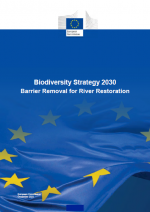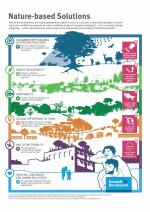Ecologic Institute Newsletter No 232 – January 2022
- Ecologic Institute Newsletter
Technical, Regulatory, Economic and Environmental Effectiveness of Textile Fibres Recycling – Report
This report aims to improve the knowledge about textile recycling. It highlights the opportunities and challenges of textile waste recycling technologies developed and applied at global and EU level. The report sheds light on the technical feasibility and maturity for market uptake of textile-to-textile recycling technologies – including mechanical and chemical recycling approaches. It also evaluates their economic and environmental effectiveness. In addition, the report identifies promising areas for future research, such as the dispersion and recovery of chemical substances or the development of alternatives to elastane. Finally, the authors, among them Ecologic Institute's Mandy Hinzmann, Dr. Martin Hirschnitz-Garbers, and Anurodh Sachdeva, outline the steps needed to support the industrial uptake of textile recycling technologies and circular business models, including fostering cross-cutting collaboration along the value chain. The report is available for download.
Barrier Removal for River Restoration – Guidance Document
The new guidance document on Barrier Removal for River Restoration has been developed by the European Commission, with the support of Dr. Eleftheria Kampa (Ecologic Institute) as advisor. It was developed to assist Member States in identifying and prioritizing barriers that could be removed to help achieve the target of the Biodiversity Strategy 2030 of transforming 25000 km of rivers into free-flowing streams. The document is available for download.
Environmental Offences in Germany 2019 – Report
This publication by Ecologic Institute provides a quantitative overview of the development and status of environmental crime in Germany between 2010 and 2019, based on data from the police crime statistics ("Polizeiliche Kriminalstatistik") and the Federal Statistical Office's criminal prosecution statistics ("Strafverfolgungsstatistik"). The report provides both an overview of general trends and an in-depth account of individual environmental offences. In addition, the publication contains data on administrative offences relating to trafficking of protected species. The report is available for download.
Nature-based Solutions and Global Climate Protection – Report
Nature-based solutions (NBS) are playing an increasingly prominent part in discussions of global climate change mitigation. This report, conducted by Oeko-Institut and Ecologic Institute, critically examines the potential impacts of NBS. The results of the literature review show that the potential of NBS to reduce greenhouse gas emissions is likely overestimated. Nevertheless, NBS can deliver various ecological and social benefits for humans and the environment and should be actively promoted. The report is available for download.
Regulatory Change Required to Enable New Solutions for a Fully Decarbonised Energy System – Report
In the "Smart Energy Showcase" programme (SINTEG), more than 300 research institutes and companies in five model regions developed solutions for a future energy system that will be entirely based on renewable energies. The participants not only developed new technologies, processes and market mechanisms, they also proposed changes to the legal framework that would allow those solutions to be scaled up. On behalf of the German Federal Ministry of Economics and Technology, which funds the SINTEG program, Ecologic Institute published a systematic overview of the individual topics for which proposals were submitted and which barriers they address in each case. Moreover, the report situates the proposals in the context of the ongoing national energy policy debate. The report is available for download.
The Glasgow Climate Summit: Necessary, but not sufficient – Article
Prof. Michael Mehling (Deputy Director, MIT Center for Energy and Environmental Policy Research (CEEPR)), and Dr. Camilla Bausch (Director, Ecologic Institute) were invited to contribute to the inaugural issue of the new journal "Klima und Recht" (Climate and Law). In their contribution, Mehling and Bausch provide an overview of the results of the Glasgow Climate Summit, covering not only formal decisions but also key initiatives and declarations announced at the Summit.
Is the Climate Getting Too Hot for Germany's Democracy? – Article
Climate protection for 1.5 degrees calls for fundamental changes in many areas, but not in Germany's democracy. Dr. Nils Meyer-Ohlendorf discusses the relationship between climate protection and democracy in an article for the Tagesspiegel. The article is available online.
CO2 Removal Unsolved – Article
The EU has not clarified the contribution of CO2 removals for achieving its climate goals. The European Commission's communication on carbon cycles was an opportunity to provide more clarity. But it leaves important questions unanswered and chooses a wrong framing for future debates, writes Dr. Nils Meyer-Ohlendorf in the Tagesspiegel. The article is available online.
Ways out of the Trilemma – Article
The transport sector plays a crucial role in achieving German, European and global climate targets. Yet, policymakers pursue three goals in are of transport policy that are mutually exclusive. First, emissions in the transport sector are to be sharply reduced. Second, the transport policy framework is not to be fundamentally changed. Third, the financial burden on consumers resulting from a CO2 price is to be kept low. The German government now has the opportunity to embark on a mobility transition. However, this requires an honest approach to trade-offs, Dr. Michael Jakob writes in the Tagesspiegel. The article is available online.
Increasing Impact for Food Waste Reduction Measures – Conference
As part of the German National Strategy against Food Waste, the Dialogue Forum "Private Households", coordinated by Ecologic Institute, conducts research on reducing food waste. During the online conference on 25 November 2021, the topic of "impact" was the focus of discussions with actors from civil society, initiatives, administrations and research. The results of the event and the guidelines for planning measures based on an impact logic, which were presented there for the first time, are now available online.
Objectives and Indicators for the Dietary Shift in Germany with a Focus on Proteins – Workshop
About 35 experts discussed possible indicators for a "protein transition" in an online workshop on 30 November 2021, as part of the Ecologic Institute-led project "STErn" on the socio-ecological transformation of the food system. The indicators are intended to help establish and monitor the necessary change in dietary styles towards more plant-based and less animal-based foods at the political level. The workshop was based on an input paper presented by the lead author Stephanie Wunder. The results of the event and the input paper presented are available online.
Researcher with Expertise in Resource Conservation and Circular Economy
To support our team in Berlin, we are looking – as soon as possible – for a Researcher with expertise in resource conservation and circular economy (part-time). Ecologic Institute's Resource Team welcomes applications from candidates with environmental policy expertise to assist with projects in the areas of analysis and evaluation of resource conservation and circular economy strategies.
Fellow with Expertise in Climate Policy with Focus on Political Science
To support our team in Berlin, we are looking – as soon as possible – for a Fellow with expertise in climate policy with focus on political science. Ecologic Institute's research focuses on how German and European climate policy can shape the transformation to climate neutrality and the framework conditions needed to achieve it. What are the goals that need to be set and how should they be assigned? What is the role of strategic, long-term planning in achieving these set goals, and how should effective monitoring be designed? Who should be involved in the processes, in what capacity and for what purposes? And what is the legal framework in which these aspects are organized and coordinated? If this piques your interest, our Climate Team is looking forward to your application!
Office Manager
We are looking for active support in the area of office organization for our office in Berlin-Charlottenburg/Wilmersdorf. Our office team is the nerve center of Ecologic Institute. Here, the threads run together, and the areas of assistance to the institute's management, travel management, proposal management, as well as reception, mail, procurement, and administrative support for the scientific staff are located. Along with six colleagues, you will ensure that office operations run smoothly, making life easier for the Institute's more than 100 employees!
Student Assistant in the Field of Data and Business Intelligence
As Student Assistant in the field of Data and Business Intelligence you will support our Institute in the efficient development of a data architecture, the documentation of new approaches and the use of innovative technologies in the data environment.
Compulsory Internship Graphic Design
Are you interested in putting the knowledge you gained during your studies into practice as part of your compulsory internship? Do you have a passion for environmental protection and sustainability? If so, the Communications Team of the non-profit Ecologic Institute is looking forward to helping you with your mandatory internship! The Communications Team is an important part of Ecologic Institute and produces almost everything in-house: brochures, flyers, the institute's website, animated films as well as infographics.
Contents
- Publications
- Technical, Regulatory, Economic and Environmental Effectiveness of Textile Fibres Recycling – Report
- Barrier Removal for River Restoration – Guidance Document
- Environmental Offences in Germany 2019 – Report
- Nature-based Solutions and Global Climate Protection – Report
- Regulatory Change Required to Enable New Solutions for a Fully Decarbonised Energy System – Report
- The Glasgow Climate Summit: Necessary, but not sufficient – Article
- Is the Climate Getting Too Hot for Germany's Democracy? – Article
- CO2 Removal Unsolved – Article
- Ways out of the Trilemma – Article
- Events
- Increasing Impact for Food Waste Reduction Measures – Conference
- Objectives and Indicators for the Dietary Shift in Germany with a Focus on Proteins – Workshop
- We are Hiring!
- Researcher with Expertise in Resource Conservation and Circular Economy
- Fellow with Expertise in Climate Policy with Focus on Political Science
- Office Manager
- Student Assistant in the Field of Data and Business Intelligence
- Compulsory Internship Graphic Design


